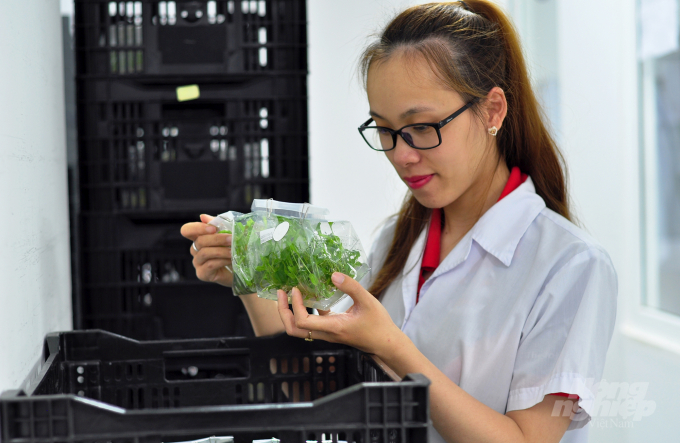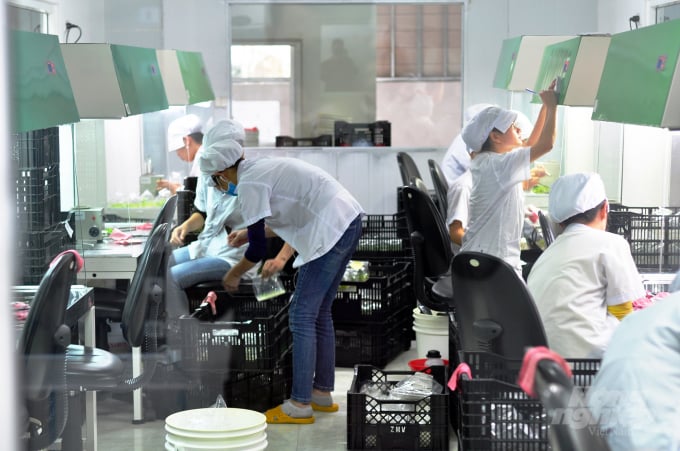May 24, 2025 | 16:28 GMT +7
May 24, 2025 | 16:28 GMT +7
Hotline: 0913.378.918
May 24, 2025 | 16:28 GMT +7
Hotline: 0913.378.918
Since the 2000s Lam Dong Provincial People's Committee has identified in vitro tissue culture technology as the most important factor in serving high-tech agricultural production. Lam Dong now has 56 organisations and facilities applying tissue culture which have contributed to the modernisation of the production of vegetables and flowers in the province.
Ha Ngoc Chien, Director of Lam Dong Plant Protection and Cultivation Sub-Department, said that tissue culture production facilities in the province have produced 72.3 million seedlings. Of these, approximately 33.4 million seedlings are for export while the rest are for domestic production. Particularly in 2020, with 29 establishments specializing in flower nurseries, more than 1 billion flower seedlings have been supplied over an area of 9,300 hectares.

Every year, tissue culture facilities in Lam Dong produce tens of millions of seedlings for production and export needs. Photo: Minh Hau.
In Lam Dong, the number of in vitro seedlings for export is mainly produced by Da Lat Flower Forest Biotechnology Joint Stock Company, Cao Nguyen Seedling Joint Stock Company (HIVICO), F1 Biotechnology Co. Ltd. and Quang Nguyen Da Lat Co. Ltd.
Chien said that most businesses and establishments are not able to buy copyrights of original seedling of plant varieties. Instead they usually select mother plants through trial productions in the field.
Accordingly, establishments choose imported varieties or domestic varieties to be used in the field, evaluate them, then select and bring them back to the breeding farm. These plants are then monitored for the next two to three seasons. If they display stable growth, good disease resistance, and 100% color integrity, they will become mother plants.
In Lam Dong the selection of mother plants is mainly carried out by centers, institutes, large-scale schools and several enterprises with high investment capital. Small production facilities just use whichever plants are available to be grown in the garden.
This method of selection is one of the factors that seriously affects seed quality, especially the problem of pest management in the field.
In addition to the difficulty of buying the original seed copyrights, investment in the facilities of small establishments is still modest and inconsistent. In particular the isolation space between the transplant room and the tissue culture room is often not built according to correct procedures, but instead mainly based on experience. Human resources for in vitro production in these enterprises and establishments are often insufficient in terms of quality and numbers.
According to the Sub-Department of Cultivation and Plant Protection of Lam Dong province, in vitro seed technology is essential for the development of the local horticulture industry. Therefore institutes and schools need to develop a process to select mother plants which ensures satisfactory variety, lack of disease, and genetic and morphological stability.

In vitro seed technology plays an important role in agricultural production in Lam Dong, but this field still faces many difficulties. Photo: Minh Hau.
This seedling source will then be transferred to tissue culture production facilities. Institutes and schools also need to strengthen training for tissue culture facilities in the province.
To have well-controlled and effective production of tissue culture seeds, the Lam Dong Plant Protection and Cultivation Sub-Department also recommends enterprises supply inputs such as equipment and materials for culture models.
According to Chien, laboratories in the province now need to have their scale and technology upgraded to meet the increasing standards of the market, especially for export.
In Lam Dong there is no policy on converting agricultural land to specialized land for the construction of labs. It is therefore necessary to have specific policies for this issue so that enterprises can actively reinvest and improve production capacity.
Tissue culture businesses also need to pay attention to and invest in purchasing copyrights of original varieties and mother plants as well as preserving genetic resources to improve efficiency in tissue culture.
Lam Dong province currently has 29 out of 56 tissue culture production and business establishments which have built all three required rooms, including the environment preparation room, the sterile culture room, and the culture room. These ensure that plants are not contaminated with microorganisms before planting.
There are eight establishments belonging to large institutes, schools and enterprises with tissue culture rooms designed and built according to specifications and in locations suitable for businesses to control tissue culture seedlings.
There are 27 out of 56 facilities with only one to four transplant boxes whichs often take advantage of the family's facilities and materials to form a tissue culture room. This small area has led to the isolation between the rooms not being satisfactory, especially when controlling conditions such as temperature, humidity and light. Furthermore the air filtration system of the culture room is often not installed, which could affect the protection of tissue plants from pathogens .
Translated by Hien Anh

(VAN) The People's Committee of Tra Vinh province has approved an adjustment to the investment policy for the Green Hydrogen Plant project, increasing its area to approximately 52.76 hectares.
![Reducing emissions from rice fields: [2] Farmers’ commitment to the soil](https://t.ex-cdn.com/nongnghiepmoitruong.vn/608w/files/news/2025/05/05/dsc08881jpg-nongnghiep-140632.jpg)
(VAN) Clean rice cultivation model in Thuong Tan commune, Bac Tan Uyen district, is assisting local residents in achieving sustainable agriculture by substantially reducing costs, increasing productivity, and protecting the environment.

(VAN) At the conference to disseminate Resolution No. 68, AgriS introduced its digital agricultural ecosystem and reaffirmed its commitment to accompanying the Government in promoting private sector development and sustainable agriculture.

(VAN) 'Blue Ocean - Blue Foods' initiative is designed to restore marine ecosystems and establish sustainable livelihoods for local communities by cultivating a minimum of 1,000 hectares of cottonii seaweed in the first three years.
/2025/05/21/4642-3-112707_603.jpg)
(VAN) The V-SCOPE project has made direct contributions to three out of six pillars of the Comprehensive Strategic Partnership between Vietnam and Australia.

(VAN) Facing the threat of rabies spreading to the community, Gia Lai province urgently carries out measures to vaccinate dogs and cats on a large scale.

(VAN) Disease-free livestock farming not only protects livestock herds but also stabilizes production and livelihoods for many farmers in Tuyen Quang.